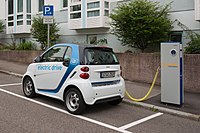Plug-in electric vehicles in Singapore
The adoption of electric vehicles in Singapore is supported by the Singapore government via the Singapore Green Plan 2030 to have new car models required to run on cleaner energy sources and installation of up to 60,000 electric vehicle charging stations. Financial incentives are given to the public for installation of charging points and purchase of electric cars.
As of May 2023[update], there were 7,961 electric vehicles registered in Singapore, equivalent to 1.2% of all vehicles in the country.
Charging infrastructure
[edit]In September 2021, a tender was awarded to install more than 600 charging points in public carparks.[1] Charge+ and a consortium led by ComfortDelGro won the tender.[1]
In July 2021, there were around 2,000 public charging stations in Singapore, with one-third of the stations in private premises which are mostly in commercial developments like shopping malls.[2]
In March 2022, during a Committee of Supply debate on the Singapore Green Plan 2030, Transport Minister S Iswaran announced that by 2025, every HDB car parks will have a minimum of three charging points each.[3] Tender to install the charging points is to be launched within the first half of 2022.[3] The tender was awarded to 5 operators, Charge+, ComfortDelGro Engineering, SP Mobility, Shell Eastern Petroleum and Strides Automotive Services, to install and operate at least three charging points in each HDB carpark, making a total of at least 12,000 EV charging points.[1]
The number of charging stations increased to 2,500 in July 2022.[4]
In April 2023, The Straits Times reported that slightly more than 30 EV chargers had been installed in 12 Housing and Development Board (HDB) carparks under the new tender. ChargEco, a joint venture of electricity supplier YTL PowerSeraya and Strides Automotive Services, and Charge+ were the only two out of the five operators who had installed the chargers.[5]
By December 2023, the number of charging stations increased to almost 6,000 charging points.[6]
As of January 2024, more than 2,400 EV chargers had been installed at about 700 HDB residential carpark.[6]
In March 2024, EV-electric (EVe), a subsidiary of the Land Transport Authority to manage charging points deployment, signed an agreement with Huawei to install Ultra-fast chargers in Singapore.[7]
Domestic manufacturing
[edit]Dyson initially planned to build an electric car manufacturing plant in Singapore but eventually cancelled the plans in October 2019.[8]
In 2020, Hyundai set up an Hyundai Motor Group Innovation Centre (HMGICS) in Jurong Innovation District within Jurong.[9] The centre also contains an electric vehicle manufacturing plant, the first in Singapore.[9] The center was completed at a cost of $400 million in January 2023.[10] It was originally expected to be completed by November 2022 but was delayed by the COVID-19 pandemic in Singapore.[10]
Sales
[edit]As of September 2021[update], the Tesla Model 3 was the best-selling electric car in Singapore.[11]
In September 2022, EV registrations were about 19% of all new car registrations.[1]
By the end of 2022, there were 6,531 electric vehicles registered in Singapore, equivalent to 1% of all vehicles in the country.[12]
As of May 2023[update], there were 7,961 electric vehicles registered in Singapore, equivalent to 1.2% of all vehicles in the country.[13] BYD overtook Tesla to become the top-selling EV brand in Singapore.[13][14]
Transit
[edit]In March 2022, there were 60 electric public buses in use with plans to convert half of Singapore’s public bus fleet (5,800 buses in March 2022) to be electric buses by 2030.[3]
Taxis operators of Singapore also planned to have half of Singapore’s taxi fleet (around 15,000 taxis in March 2022) to change to electric taxis by 2030.[3] Land Transport Authority had extended the statutory lifespan of electric taxis from 8 to 10 years to let operators recover their investment in electric taxis.[3]
Government
[edit]On 10 February 2021, the government released the Singapore Green Plan 2030 which includes the installation of up 60,000 electric vehicle charging points.[15]
In July 2021, the government offers rebates via the Electric Vehicle Common Charger Grant for charging station installations equivalent to 50% of the cost of installation, capped at S$4,000 for 2,000 charging stations.[2] The grant expires on 1 January 2024 or when grants for 2,000 chargers had been awarded.[2]
As of October 2022[update], the Singaporean government offers tax rebates of up to S$45,000 for electric vehicle purchases.[16] As of November 2022[update], the government offers a 45% rebate on car registration fees for electric cars.[17]
References
[edit]- ^ a b c d Lee, Nian Tjoe (2 November 2022). "5 operators picked to run at least 12,000 charging points in HDB carparks by end-2025 | The Straits Times". www.straitstimes.com. Retrieved 24 April 2023.
- ^ a b c Toh, Ting Wei (19 July 2021). "Tesla sets up electric vehicle charging points in Orchard Central; condos may apply for grant to install chargers". The Straits Times. Archived from the original on 10 December 2022. Retrieved 11 December 2022.
- ^ a b c d e "Nearly 2,000 HDB car parks to have at least 3 EV charging points each by 2025". CNA. Archived from the original on 9 December 2022. Retrieved 18 April 2023.
- ^ Brunner, Joel Henri (6 July 2022). "Singapore's electric jolt to decarbonise cars". nextrends Asia. Archived from the original on 10 December 2022. Retrieved 11 December 2022.
- ^ Lee, Nian Tjoe (22 April 2023). "Only 30 EV chargers set up in HDB carparks since January, but LTA says it can meet target for 2023 | The Straits Times". www.straitstimes.com. Retrieved 24 April 2023.
- ^ a b Kok, Yufeng (18 January 2024). "EV chargers installed at 700 HDB carparks; new public fast chargers in Toa Payoh, Punggol". The Straits Times. ISSN 0585-3923. Retrieved 11 July 2024.
- ^ Lee, Nian Tjoe (18 March 2024). "Ultra-fast EV chargers in S'pore by end-2024 under EV-electric tie-up with Huawei". The Straits Times. ISSN 0585-3923. Retrieved 11 July 2024.
- ^ Leong, Grace; Ang, Prisca (10 October 2019). "Dyson to end electric car project, EDB says disruption to firm's Singapore workforce is minimal". The Straits Times. ISSN 0585-3923. Retrieved 13 June 2023.
- ^ a b "Construction of Hyundai's electric car manufacturing plant in Singapore begins". TODAY. Retrieved 19 April 2023.
- ^ a b Tan, Christopher (11 January 2023). "Hyundai to roll out first S'pore-assembled cars in first half of 2023 | The Straits Times". www.straitstimes.com. Retrieved 19 April 2023.
- ^ Oh, Tessa (29 December 2021). "Singapore's electric vehicle journey in 2021: What are the key developments?". The Straits Times. Archived from the original on 10 December 2022. Retrieved 11 December 2022.
- ^ "MOTOR VEHICLE POPULATION BY TYPE OF FUEL USED" (PDF). Land Transport Authority. Archived from the original (PDF) on 7 February 2023.
- ^ a b Tan, Christopher (13 June 2023). "BYD zooms past Tesla to become S'pore's best-selling electric vehicle brand". The Straits Times. ISSN 0585-3923. Retrieved 13 June 2023.
- ^ Lee, Nian Tjoe (4 July 2024). "About 1 in 3 new cars sold in Singapore from Jan to May is an EV; over 7,100 charging points installed". The Straits Times. ISSN 0585-3923. Retrieved 11 July 2024.
- ^ Ang, Hwee Min; Mohan, Matthew (10 February 2021). "Singapore unveils Green Plan 2030, outlines green targets for next 10 years". CNA. Archived from the original on 8 March 2022. Retrieved 7 March 2022.
- ^ Lin, Chen (21 October 2022). "Singapore's quirky car market offers rare profit for some as prices soar". Reuters. Archived from the original on 7 November 2022. Retrieved 8 November 2022.
- ^ Zhu, Michelle (29 November 2022). "Singapore commercial EV sales to see boost from incentives, but limited options a barrier: Fitch Solutions". The Business Times. Archived from the original on 10 December 2022. Retrieved 11 December 2022.


